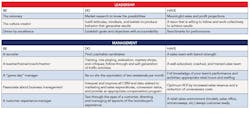For most small- to medium-size builders, the biggest challenge is one person being assigned a title such as Sales Manager or VP of Sales. The title alone creates a conflict. When considering leadership versus management, it’s not a question of which is more important; what’s key is understanding the relationship between the two. The purpose of the sales management job requires specific expertise to achieve a level of excellence in both. The true title for this job should probably be something like CRP (Chief Revenue Producer).
How Are Leadership and Management Different?
Stephen Covey, author of The 7 Habits of Highly Effective People, noted that leadership determines if the ladder is leaning against the proper wall, while management ensures that the climb to success is an efficient one.
To delve further into the relationship between leadership and management, I turned to Mike Moore (makingcustomers.com) a colleague, friend, and industry expert on leadership and coaching. Together we formulated a few universal principles to help you distinguish between leadership and management.
Leading People, Managing Things
Leadership involves seeing the way things could be, looking to the future, and having a defined vision. A leader chooses the desired result, inspires others to reach expected goals, and sets the path and pace of where a team of people should be going.
A great leader is a likable, trustworthy, caring, and courageous visionary. She or he has a love and a respect for people, with a passion for helping others to achieve their goals, which fosters an environment of accountability. A leader must be obsessed with excellence through continuous improvement and be a lifelong learner, always reading and studying. That person leads by example, is inspiring, and is more concerned with being respected for his or her actions than being liked.
Management focuses on the efficiency and effectiveness of the systems and processes of how to get there, adapting daily activities that are directed toward the desired results. Effective managers are good administrators with an in-depth understanding of the systems and processes utilized by the organization. Additionally, they must maintain attention to detail, focus, and determination to get what’s required completed.
Sometimes the demands of leadership and management converge and are assigned to one person. A variety of tasks and objectives must then be accomplished, requiring the blending of personas while also maintaining focus on the main purpose.
The late motivational speaker Zig Ziglar said, “You’ve got to be before you can do, and you’ve got to do before you can have.” The chart above uses that perspective to offer examples to help understand and then navigate crossover between leadership and management.
Can You Blend Leadership and Management?
One of the most important things to fully understand in this blending of leadership and management is that very few people are naturally adept at both. It takes time and dedication to determine the strengths of the people put in positions of authority and responsibility. One of the biggest mistakes builders may make is elevating their best salesperson to the position of sales manager. (Now they’ve screwed up two careers, and probably their company as well.)
In the absence of clearly defined job descriptions, behavioral-style testing, and agreement on the roles and expected results (the be, the do, the have), most people will spend time and work only on those tasks with which they are comfortable, and ignore all the rest.
Learning to identify which activities and roles are not strengths and to either develop those weaknesses into strengths or, when appropriate, to delegate or outsource to others with more expertise is, in and of itself, a sign of leadership.
Of all the attributes a sales leader must develop, the foremost is that of a coach. To excel in this role, she or he must be very good at what they’re coaching. As in professional sports, only a couple of times has an athlete been successful at simultaneously playing and coaching, and when they did, it was thanks in large part to extraordinary leadership and management teams around them.
It’s no different in home building. Expecting someone to be a top sales producer, as well as leading and managing a team, is almost always a recipe for failure. Knowing the difference between leadership and management is crucial to sales success.
About the Author

Bob Schultz
Bob Schultz is president and CEO of Bob Schultz & The International New Home Sales Specialists. Write him at [email protected].

